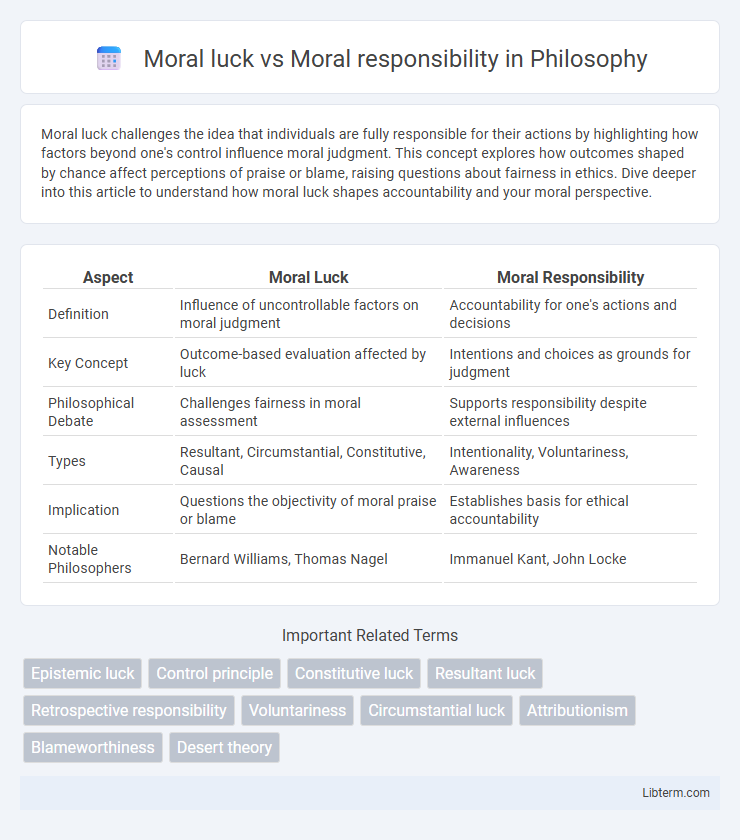Moral luck challenges the idea that individuals are fully responsible for their actions by highlighting how factors beyond one's control influence moral judgment. This concept explores how outcomes shaped by chance affect perceptions of praise or blame, raising questions about fairness in ethics. Dive deeper into this article to understand how moral luck shapes accountability and your moral perspective.
Table of Comparison
| Aspect | Moral Luck | Moral Responsibility |
|---|---|---|
| Definition | Influence of uncontrollable factors on moral judgment | Accountability for one's actions and decisions |
| Key Concept | Outcome-based evaluation affected by luck | Intentions and choices as grounds for judgment |
| Philosophical Debate | Challenges fairness in moral assessment | Supports responsibility despite external influences |
| Types | Resultant, Circumstantial, Constitutive, Causal | Intentionality, Voluntariness, Awareness |
| Implication | Questions the objectivity of moral praise or blame | Establishes basis for ethical accountability |
| Notable Philosophers | Bernard Williams, Thomas Nagel | Immanuel Kant, John Locke |
Understanding Moral Luck: An Overview
Moral luck occurs when factors beyond a person's control influence the moral judgment of their actions, complicating the assessment of moral responsibility. This phenomenon challenges traditional ethical theories by highlighting how outcomes, circumstances, and intentions can unpredictably affect accountability. Understanding moral luck requires examining the interplay between external conditions and individual agency in moral evaluations.
Defining Moral Responsibility in Ethics
Moral responsibility in ethics refers to the obligation of individuals to be accountable for their actions based on ethical principles and intentions, regardless of the outcomes. It emphasizes the role of free will and rational decision-making in determining culpability, even when circumstances influenced by moral luck affect the consequences. This concept underlines that ethical evaluation hinges on the agent's control and knowledge at the time of the act rather than solely on results.
Types of Moral Luck
Moral luck occurs when factors beyond an individual's control influence the moral judgment of their actions, challenging the fairness of moral responsibility. Types of moral luck include resultant luck, which depends on the outcomes of actions; circumstantial luck, involving the situations faced; constitutive luck, relating to a person's character and dispositions; and causal luck, concerning the chain of events leading to a decision. These variations reveal how external elements unpredictably shape ethical evaluations, complicating the assignment of moral praise or blame.
The Debate: Can Luck Influence Moral Judgments?
The debate over moral luck versus moral responsibility centers on whether uncontrollable factors should affect ethical evaluations. Philosophers argue that outcomes influenced by luck challenge the fairness of attributing blame or praise solely based on intentions. Empirical studies reveal that people's moral judgments often vary depending on the consequences of actions, highlighting the complex interplay between luck and responsibility in ethical assessments.
Case Studies: Moral Luck in Real Life
Case studies of moral luck in real life highlight how outcomes beyond an individual's control influence judgments of moral responsibility, such as the contrasting legal consequences faced by two drivers involved in similar accidents but differing in unintended harm caused. The distinction between resultant moral luck, where outcomes affect moral assessment, and circumstantial moral luck, where context influences choice availability, is critical in legal and ethical analyses. These real-world examples reveal complexities in assigning moral accountability, emphasizing the interplay between intention, control, and unforeseen factors.
Philosophical Arguments on Moral Responsibility
Philosophical arguments on moral responsibility critically examine how factors beyond an individual's control, known as moral luck, influence the attribution of praise or blame. Notable theorists like Thomas Nagel argue that outcomes heavily affect moral judgments despite being contingent on luck, challenging the fairness of holding individuals fully responsible. Debates often focus on whether moral responsibility requires full control over actions and consequences or if it can coexist with the inevitability of luck.
Criticisms of the Moral Luck Concept
Criticisms of the moral luck concept highlight its challenge to traditional notions of moral responsibility by suggesting that factors beyond an agent's control influence moral judgment. Scholars argue that attributing moral blame or praise based on outcomes affected by luck undermines fairness and accountability in ethical assessments. This criticism emphasizes the need to distinguish between an agent's intentions and external circumstances to preserve coherent moral responsibility frameworks.
Reconciling Moral Luck with Justice
Reconciling moral luck with justice involves acknowledging how factors beyond an agent's control influence moral judgments while striving to maintain fairness in assigning responsibility. Philosophers propose frameworks where outcomes and intentions are weighed to balance external circumstances with individual accountability. This approach emphasizes contextual evaluation to ensure just moral assessments despite the presence of moral luck.
Implications for Law and Society
Moral luck challenges traditional notions of moral responsibility by highlighting how factors beyond an individual's control influence judgments of blame and praise, complicating legal accountability standards. This concept urges lawmakers and society to reconsider the fairness of holding individuals fully responsible for outcomes shaped by chance, potentially prompting reforms in criminal justice systems and liability laws. Societal implications include a deeper understanding of how context and uncontrollable circumstances affect behavior, encouraging more nuanced evaluations of moral and legal responsibility.
Moving Forward: Rethinking Moral Responsibility
Rethinking moral responsibility requires acknowledging the influence of moral luck on individuals' actions while maintaining accountability for their choices. Emphasizing context-sensitive evaluations helps develop fairer ethical frameworks that consider factors beyond direct control. Incorporating insights from philosophy and psychology enables more nuanced judgments, fostering growth and ethical development moving forward.
Moral luck Infographic

 libterm.com
libterm.com